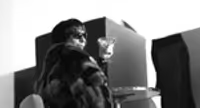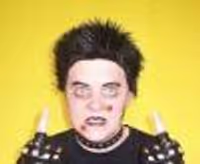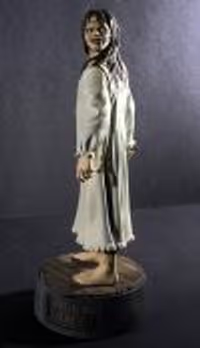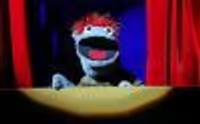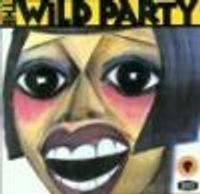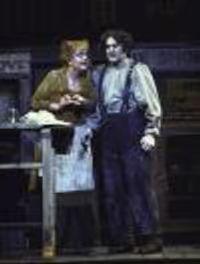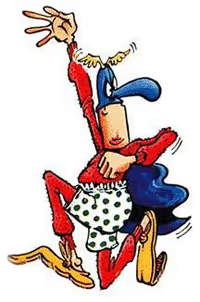Best Orchestration... Really???
#25re: Best Orchestration... Really???
Posted: 5/23/06 at 3:25pm
What? Why would they cut the final ballad of Sweeney Todd?
That's one of the most (if not the most) powerful moment of the show.
#26re: Best Orchestration... Really???
Posted: 5/23/06 at 3:25pm(.) Updated On: 5/23/06 at 03:25 PM
Caleb
Understudy Joined: 11/16/04
#27re: Best Orchestration... Really???
Posted: 5/23/06 at 3:40pmAs a composer, I feel the job of the orchestrator is to serve the score as well as possible. Did Sweeney's orchestrations serve the score as well as they could have? In my opinion, no, not at all. I'm not just saying this because the instrumentation is so spare. Look at Bruce Coughlin's work on See What I Wanna See. He was basically dealing with an ensemble of comparable size to Sweeney's, and his tiny orchestrations really sparkle and come to life in a way that I don't think Sweeney's do. I'm not saying Coughlin should win the Tony because I know his work was off Broadway, and I'm not saying that Sarah Travis's orchestrations are bad because someone who didn't know what they were doing could have butchered Sondheim's score. I'm just agreeing with the original post in saying that designating Sweeney as the shoe-in for the Tony is not necessarily rewarding the best work done this season.
#28re: Best Orchestration... Really???
Posted: 5/23/06 at 3:45pm
Of all the moments in the show (which I didn't like as a whole but recognize there were some terrific moments), the final BALLAD OF SWEENEY TODD was the most powerful?
I'd go with Tobias being strapped back into the chair. That's the image I wanted to be left with and felt the final Ballad was superfluous and wrecked that terrific image.
#29re: Best Orchestration... Really???
Posted: 5/23/06 at 4:39pm
I agree w/ Robbie on this. I felt the best final impression was silence.
That changes nothing about how much I loved and am amazed by Travis' accomplishments here, however.
"In Oz, the verb is douchifizzation." PRS
#30re: Best Orchestration... Really???
Posted: 5/23/06 at 5:19pm
I find myself again weighing in, as I did with the category Best Score and Lyrics to say that perhaps the award description should say "best ORIGINAL orchestrations" because it seems to my ear that Ms. Travis has simply re-arranged Tunick's original score for a smaller and less professtional orchestra. While it is clever work and probably deserves some sort of recognition, it just isn't the same thing as orchestrating an original musical.
I don't proclaim to know how Sondheim works, but I have had some exposure to the works of other great composers, such as Richard Rodgers and Fritz Loewe. They wrote 4-to-6 page lead sheets of the basic tune and lyrics, which were often then arranged by others. THEN an orchestrator came in and took the finished 10-to-15 page song and made the orchestra arrangements. Johnathon Tunick wrote the fills and the counter melodies, set the rhythm, perhaps chose the final keying -- THIS is original creative work. Ms. Travis ADAPTED his work (and that's not to diminish the cleverness of her work but even she might want to win a Tony for her own original efforts).
The works of Richard Rodgers have been performed all over the world to the accompanyment of the original piano score. I don't think anyone proposed giving a Tony award to Trude Rittman (although she probably deserved one, if just for longevity).
leefowler
Broadway Star Joined: 7/13/04
#31re: Best Orchestration... Really???
Posted: 5/23/06 at 5:33pm
Allofmylife, I completely agree with you.
I'll file Travis' Tony with Anne Reinking's for Chicago
#32re: Best Orchestration... Really???
Posted: 5/23/06 at 6:24pm
Ann Reinking created HER own moves for Chicago, but using the Fosse style.
She kept HOT HONEY RAG exactly the same, as that is a signature Fosse number.
She completely deserved that Tony, and was without a doubt the best choreography that year.
---
And about the most powerful moment in Sweeney. I should restate - I feel Tobias being strapped up, the final ballad, and the door slam, were the most powerful moments for me.
#33re: Best Orchestration... Really???
Posted: 5/23/06 at 7:53pmI think Travis deserves a Tony Award. She really did a brilliant job with Sweeney's orchestrations. One thing I think is amazing about them is that I could reallly hear some of the musical motifs Sondheim put into the songs. For example, in Poor Thing, while Mrs. Lovett says "Johanna. That...." you can hear the piece of music that is played while she says this. When I went back to the original, I realized this couldn't be heard as well. I aslo think the new orcehstrations bring a certain intensity to this particular production
Yankeefan007
Broadway Legend Joined: 3/20/04
#35re: Best Orchestration... Really???
Posted: 5/23/06 at 8:09pm
I believe that a couple of years ago Jonathan Tunick was nominated for a reduced orchestration of his original orchestrations.
I believe that Sarah Travis' orchestrations for Sweeney are great for the production and within the context of the show. But, the basic melodic lines and counterpoints from the original are still pretty much retained. I did listen to the CD, and found that the orchestrations really don't hold up that well. Meaning, as a listening experience for Sweeney, I would rather listen to the OBC or NYPhil CD to hear the full score. I found the revival CD to be Sweeney performed with a piano and a few other instruments.
In terms of best orchestration On or Off-Broadway, I think Bruce Coughlin's work on "See What I Wanna See" is terrific. Properly supports the performances, excellent instrumentation and different textures throughout. Fine and inventive work overall. Although I also enjoyed his work on "Grey Gardens", I feel that GG could have used a bigger orchestra.
leefowler
Broadway Star Joined: 7/13/04
#36re: Best Orchestration... Really???
Posted: 5/23/06 at 8:20pmActually, I think Sarah Travis' work on Sweeney is very comparable to that of Anne Reinking's in Chicago. Anne Reinking took the Bob Fosse's ideas, and structure, that he created for the original Chicago and plugged in some different steps. Travis did a similar thing with Tunick's original orchestrations. And I think it's worthy of note that Fosse and Tunick have a huge body of work behind them, with many successes, but I'm not aware of Reinking or Travis having had a single original success between them except for Sweeney and Chicago.
#37re: Best Orchestration... Really???
Posted: 5/23/06 at 8:30pm
ChEMD ah, to have your eloquence. You stated exactly what I meant to say from a musical standpoint. The award may be "Best Orchestration" but it should be "Best Original Orchestration." To say you heard Tunick's work echoed in Travis' is a sad commentary for the other nominees.
That's why they now have "Best Revival" categories.
And for those of you who don't know (and a few PM'd me) when I was referring to Trude Rittman, if you peruse an original vocal score of any musical from the 40's, 50's or 60's chances are on the first or second page it will say "Piano reductions by Trude Rittman." That was one prolific, er, reducer (ChEMD, wanna help me out here?)
#38re: Best Orchestration... Really???
Posted: 5/23/06 at 8:55pm
AOML,
I believe Trude Rittman did some of the vocal score reductions, but she was primarily a dance music arranger. I think she died within the past 5 years.
The other sad thing is that [not to sound cynical], but I doubt most of the Tony voters can properly determine what the best orchestration should be. Paul Gemignani mentioned this a few years ago and proposed a committee comprised of musical directors, composers, and orchestrators to nominate [and vote].
How many of them can distinguish between the score and the orchestrations? Obviously they couldn't when Billy Joel won for Best Orch a few years ago, over Harold Wheeler who probably should have won for Hairspray.
Anyways, I found the best orchestrations and musicals, in general, to be off-broadway this year. I enjoyed listening to Bruce Coughlin's and Michael Starobin's work off-bway this year.
Jazzysuite82
Broadway Legend Joined: 2/6/05
#39re: Best Orchestration... Really???
Posted: 5/23/06 at 9:26pmI too liked Bruce's work on See WHat I Wanna See. I must say though, I think Michael Starobin's was a hint superior for Bernarda Alba.
#40re: Best Orchestration... Really???
Posted: 5/23/06 at 9:35pm
Um. Ann Reinking did a lot more than change a few steps.
For instance, CELL BLOCK TANGO is almost completely different from the original. The original was behind bars, Reinking's takes place on chairs.
#41re: Best Orchestration... Really???
Posted: 5/24/06 at 12:26am
Sondheim writes out fairly detailed two-stave accompaniments. Tunick (or Starobin) has sometimes added countermelodies (for example, the scalar countermelody in mm. 29-33 of "Losing My Mind"![]() , and, of course, songs often end up in different keys, but . . . well, let's let Sondheim discuss it:
, and, of course, songs often end up in different keys, but . . . well, let's let Sondheim discuss it:
"I write extremely complete piano copy because of . . . my training. So most of the counterpoint—in fact, all of it except for those things that are necessary to hold the orchestra together—[is] written down. . . . Jonathan is restricted by the notes I write . . . But . . . he listens to me play it on the piano and he tapes everything so hears the approach . . . where I hit the climaxes and . . . where I'm using rubato . . .he gets much more out of what I have in my mind than just the notes on the paper."
And:
"I've learned over the last 15 years more and more to notate the phrasing, otherwise Jonathan asks me . . . and then I have to tell him . . . Jonathan . .. . has never phrased anything that I didn't specifically either notate or want."
Discussing the manuscript of "A Bowler Hat":
I put all those slurs in, and the staccato notes, when the copyist made the copy. Jonathan, as he's done in about a third of the songs I've written, literally took my piano copy and wrote, 'cello, bass, clarinet, harp, etc.' In other words, a song as simple as this, and there are numerous others in my canon, doesn't need him to make his orchestration sketch anything but the actual notes that I've written. Obviously, the doublings are indeed his."
Trude Rittman said of Rodgers that he wrote out the harmony for his songs, "but in a sort of primitive way. It was not very elaborate. He was not at all well educated in music."
Rittman did indeed sometimes do more than just dance arrangements and scene change music.There's some reason to believe, for example, that she may have written the famous counterpoint to the "When you know the notes to sing" melody in "Do Re Mi."
According to Rittman, Rodgers was also much helped by his rehearsal pianist Margot Hopkins.
Rittman had more respect for Loewe, who at least sometimes did the choral arrangements for his shows. I've read that he did write a lot of the dance music, but Rittman says that he didn't, at least not for Brigadoon.
Of course, the famous choral arrangement of "Oklahoma!" was completely created by Robert Russell Bennett and Jay Blackton.
Porter, although fairly well-educated as a composer, was much helped by Albert Sirmay in notating it and sometimes suggesting harmonies. It seems, though, that Porter often wrote the dance music, even when others were credited with it.
So it really does vary.
#42re: Best Orchestration... Really???
Posted: 5/24/06 at 1:30am
Thanks nobodyhome.
You and I basically concur. I was just speculating on Sondheim but I've actually seen Rodgers holographic manuscripts and they are pretty simplistic. Obviously, others filled in and added color but let's face it, these guys did come up with amazing, unforgettable melodies.
I work in motion pictures and I vote in the Best Screenplay (original and adapted) categories along with many other members of the Writers Guild of America. In films, the actors vote on actors, the directors on directors and composers on composers. That seems to work pretty well (except for the notorious problems the Academy always has with documentary films).
Perhaps it's time to let people who can read sheet choose the best orechetrations.
#43re: Best Orchestration... Really???
Posted: 5/24/06 at 1:45am
Yes, perhaps that would be the best solution.
Thanks for the info and quotes, nobodyhome. I wondered about that since I know that Sondheim's published vocal scores are solely based on his transcripts and are not a reduction of the orchestrators' work. However, they still have all of the countermelodies and such. Sondheim is clear about what he wants, and I'm sure he helped Ms. Travis with her work here. With each of the categories at the Tonys, I see if what is being analyzed is brilliant and also fits into the show, making it more cohesive. I think Sarah Travis's orchestrations most definitely fit the concept (it certainly sounds stripped down, much like the rest of the production) and the treatment of the score is so different and beautiful. I think these orchestrations are deserving of the award.
~Steven
#44re: Best Orchestration... Really???
Posted: 5/24/06 at 11:02am
"I think those of you bashing Tunick don't realize how brilliant he is. YOu say the orchestrations were bland and pedestrian, like the score."
I love most of Tunick's orchestrations. Just not The Color Purple. Like I said, just listen to that overture, which absolutely kills it for me. When the title theme appears it is with horns in unison backed up by snare shots on the upbeats. It is so hideously 70s, it is absurd. What on earth was he thinking? Like most aspects of the show, it could have been gorgeous, but every time there is a chance to shine, it misses the mark. I'm thrilled the show is doing well, I just wish it were a better show. Personally, I wish Bombay Dreams was still running.
leefowler
Broadway Star Joined: 7/13/04
#45re: Best Orchestration... Really???
Posted: 5/24/06 at 11:15am
Tunick is a genius. Does anyone here think that if this production of Sweeney wasn't a revival, but a world premiere, and Sarah didn't have Tunick's orchestrations as a jumping off point, that the show would sound as good as it does? It's too bad there's not a Tony for best orchestral reduction.
Travis did what she did with enormous skill. As a musician, I wouldn't have believed it was possible if I hadn't seen it for myself. But that's not the same thing as doing a production from scratch.
#46re: Best Orchestration... Really???
Posted: 5/24/06 at 11:32am
I actually think that the enforced limitations in some ways makes Travis's job easier. She has limited choices, and those choices were, to some degree, beyond her control.
Even when Tunick has to work with only 12 or 13 musicians for Into the Woods, he still had to figure out which instruments would be best to realize the music. It would seem that Travis's choices of instrumentation were more or less forced upon her. I'm sure she said, "I need at least a keyboard." She may even have said (and I'm going back to the Watermill production), "An accordion would be great." Which was a very good idea. But most of the rest of it was pretty much beyond her control, which I think in some ways made her job easier.
Travis did her job very well. I don't have a strong opinion on who should get the award. But greater limitations can be helpful.
Videos


